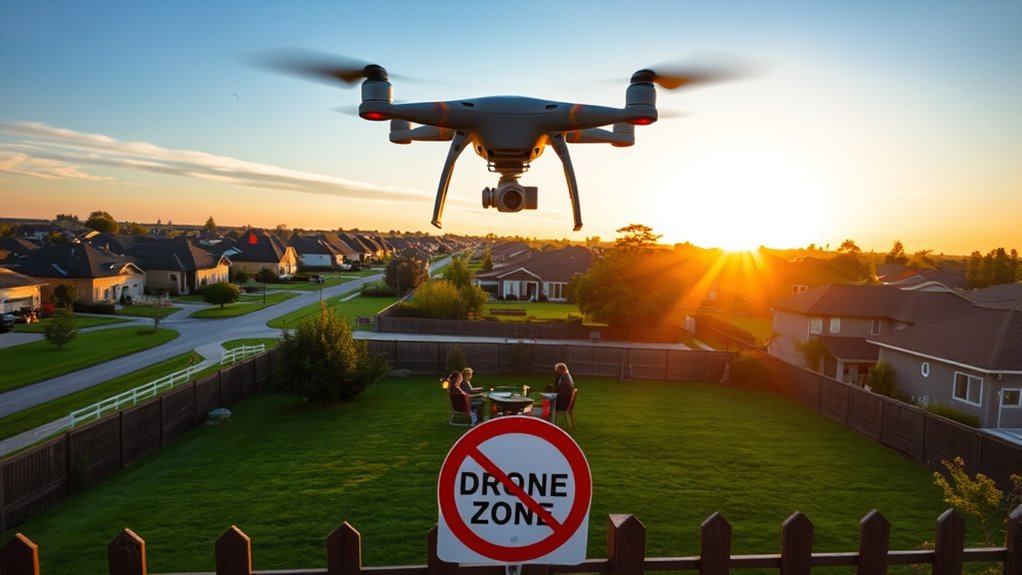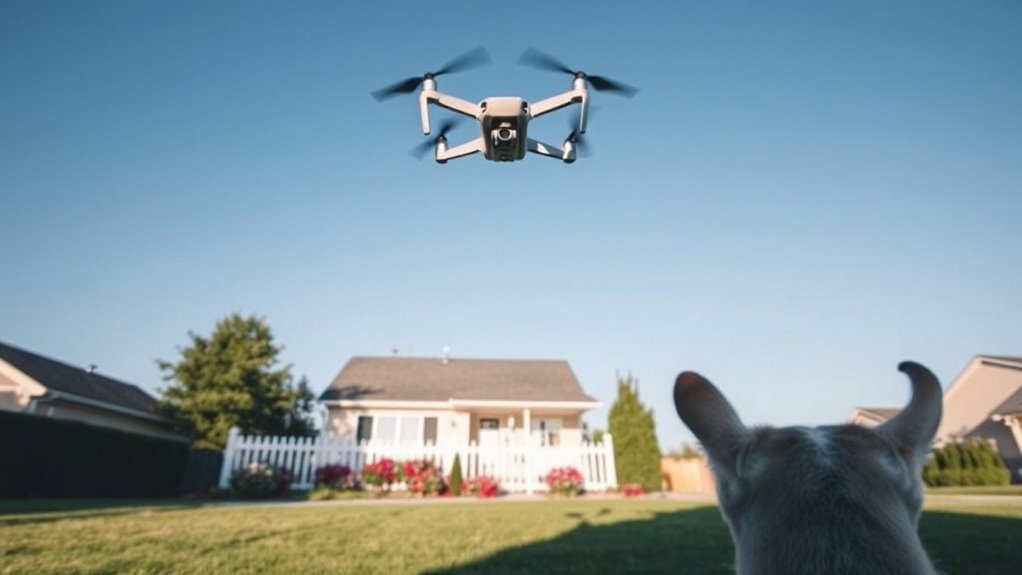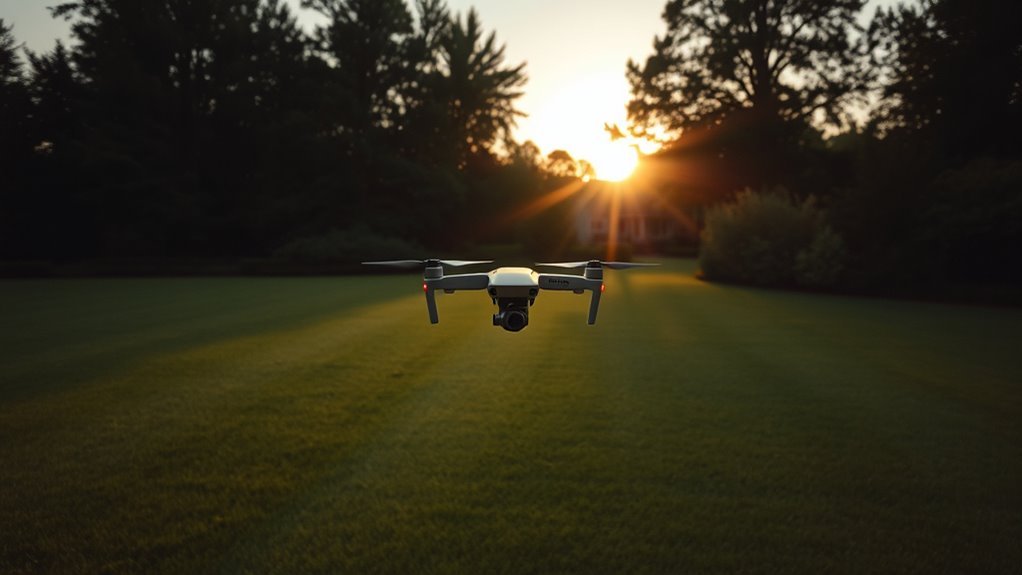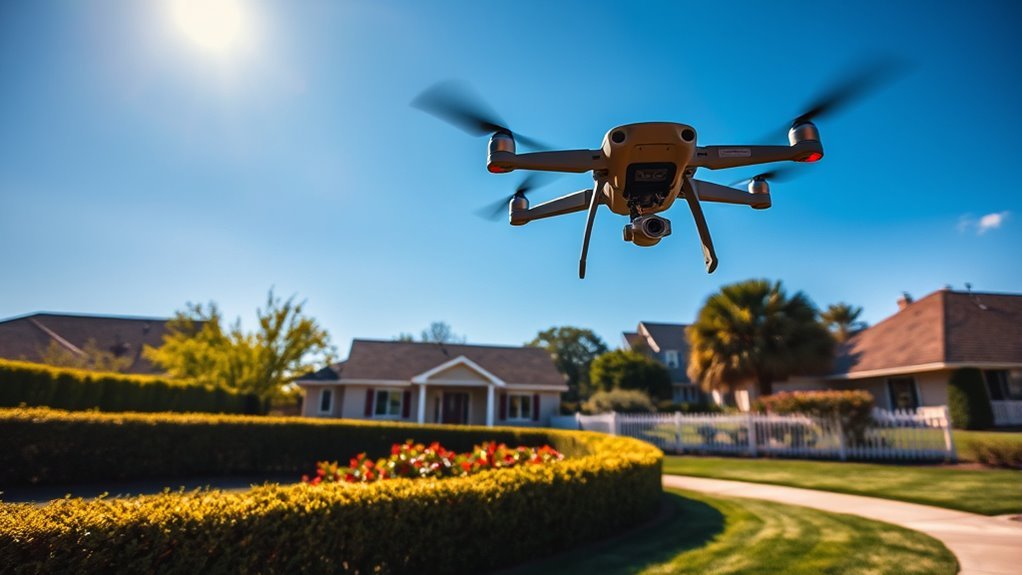Flying drones over private property isn’t outright illegal, but it’s complicated by regulations and property rights. The FAA provides guidelines that apply, but local laws can add restrictions. Generally, property owners don’t control the airspace above their land entirely, but local ordinances may define certain limitations. It’s essential to be aware of privacy concerns and potential legal ramifications. Understanding these nuances can help you navigate drone use more responsibly and effectively. There’s much more to reflect on.
Understanding Drone Regulations

Is It Illegal to Fly Drones Over Private Property?
Understanding Drone Regulations
Although drone technology offers exciting possibilities for both recreational and commercial use, understanding the regulations governing their operation is essential for anyone looking to fly them, especially over private property. Federal laws regulate drone use to guarantee safety and privacy in national airspace, and you must prioritize drone safety to avoid legal issues and respect the rights of property owners. When engaging in aerial photography, be mindful of local laws that can vary greatly by region. Familiarize yourself with restrictions regarding altitude, flight zones, and privacy concerns, as overlooking these can lead to fines or conflicts. Knowing these guidelines empowers you to explore the skies freely while honoring others’ rights. Ultimately, with informed operation, you can enjoy the benefits of your drone without compromising legal or ethical standards. Additionally, remember that privacy regulations are crucial to ensure you do not capture identifiable personal information without consent.
Federal Aviation Administration (FAA) Guidelines

When operating drones, it’s important to adhere to the Federal Aviation Administration (FAA) guidelines, which set the framework for safe and legal drone use across the United States. The FAA regulations classify drones into categories, impacting how and where you can fly. For instance, commercial usage requires a Remote Pilot Certificate, while recreational guidelines allow for less stringent requirements. Additionally, airspace restrictions must be respected; flying in controlled airspace without proper authorization could lead to serious penalties. The FAA employs enforcement measures to guarantee compliance, so understanding these regulations is vital for any drone operator. By staying informed about FAA guidelines, you can enjoy the freedom of flight while minimizing legal risks.
State Laws Governing Drone Use

As drone technology evolves, state laws governing their use have become increasingly important for operators to understand. Each state has its own set of state drone legislation, which can vary greatly. While federal guidelines provide a framework, local drone ordinances often impose additional restrictions, addressing privacy, safety, and airspace concerns. For instance, some states might require permits for commercial drone use or impose no-fly zones over specific areas. Operators must stay informed about these regulations to avoid legal pitfalls and guarantee responsible flying. Ignorance of local laws can lead to penalties or fines, jeopardizing your freedom to operate drones effectively. By understanding both state and local regulations, you can navigate the complexities of drone use with confidence. Additionally, it’s crucial to recognize that federal regulations supersede individual claims to airspace control, which can impact state laws.
Property Rights and Airspace
Understanding the intersection of property rights and airspace is vital for drone operators, especially given the legal complexities that can arise. You need to recognize that airspace boundaries don’t align neatly with property ownership. While you may own the land beneath, the airspace above is generally considered public domain, allowing for certain freedoms. However, this doesn’t mean you can disregard your neighbors’ rights. Courts have ruled that property owners have rights to the airspace directly above their land, particularly if drone activity interferes with their enjoyment of that property. Maneuvering through these nuances is essential, as violating airspace boundaries could lead to legal repercussions. Always stay informed about local regulations to guarantee your drone operations respect both property rights and airspace laws.
Privacy Concerns Related to Drones
While the rise of drone technology has transformed how we capture images and gather data, it has also intensified concerns about privacy. Drone surveillance can lead to significant privacy invasion, as these devices can easily penetrate personal spaces without consent. You might find yourself questioning the extent to which your activities are monitored from above. Notably, the advanced battery technology in some drones can extend their flight time, increasing the potential for prolonged surveillance.
| Aspect | Concern |
|---|---|
| Surveillance Range | Potentially invasive |
| Data Collection | Unwanted recording |
| Consent | Often ignored |
| Regulation | Often lagging behind technology |
| Public Awareness | Generally low |
As drones become commonplace, balancing innovation with privacy rights is essential. Understanding these implications will empower you to navigate the complexities of this evolving landscape. Furthermore, it is crucial to ensure compliance with local regulations to avoid legal issues while operating drones over private property.
Notable Court Cases and Precedents
Given the rapid evolution of drone technology, legal interpretations surrounding their use over private property have become increasingly important. Notable court rulings, such as *Cite Your Case Here*, have highlighted the tension between airspace rights and privacy concerns. In these cases, courts often weigh the implications of trespass against a property owner’s expectation of privacy. For instance, the *Cite Another Case* ruling established that while airspace is generally considered public, drones flying over private property at low altitudes may infringe on property rights. These precedents showcase the legal implications of drone usage, emphasizing the need for clear guidelines to balance innovation with individual freedoms. Understanding these cases is essential for both drone operators and property owners steering through this evolving legal landscape.
Best Practices for Drone Pilots
Steering through the legal landscape surrounding drone use requires a solid grasp of best practices for pilots. Prioritizing drone etiquette and safe flying guarantees you respect others while enjoying the freedom of the skies. Here are key points to reflect on:
Navigating drone regulations is essential for pilots to ensure safety and respect for others in the skies.
- Always check local regulations and airspace restrictions.
- Maintain a respectful distance from private property and avoid intrusive flights.
- Keep your drone within visual line of sight to guarantee control and safety. Additionally, understanding energy management can help you maximize your drone’s flight duration and ensure compliance with regulations.
- Respect people’s privacy by avoiding filming or photographing without consent.
- Consider how battery life and power management can affect your drone’s operational distance to ensure you stay compliant with regulations.
Rights of Property Owners
What rights do property owners have when it comes to drones flying overhead? You possess certain airspace rights, but these can be complex. Generally, the law recognizes that while you own the land, the airspace above it isn’t entirely yours. Most jurisdictions allow for limited use of airspace above your property, typically up to a certain altitude. However, if a drone flies within your property boundaries or causes a nuisance, you may have grounds for action. It’s crucial to understand that your rights may be influenced by local laws and regulations. Staying informed about these nuances guarantees you can effectively protect your property and privacy while maneuvering the evolving landscape of drone usage.
Consequences of Illegal Drone Flights
While many drone operators may not fully grasp the legal boundaries of their activities, flying a drone illegally can lead to significant repercussions. Ignoring these boundaries can expose you to various legal consequences that might hinder your freedom to operate drones effectively.
- Legal penalties: You could face fines or other sanctions imposed by aviation authorities.
- Civil lawsuits: Property owners may sue you for invasion of privacy or damages.
- Seizure of equipment: Authorities might confiscate your drone if it’s deemed to be operating illegally.
- Increased scrutiny: Continuous violations could result in heightened surveillance or restrictions on your flying activities. Additionally, flying in federally protected airspace can lead to even more severe legal issues, including potential criminal charges.
Understanding these potential consequences is essential for maintaining your liberties while operating drones responsibly.
Future Trends in Drone Legislation
As drone technology advances and becomes more integrated into everyday life, it’s vital to anticipate how legislation will evolve to address emerging challenges. You’ll likely notice that as drone capabilities expand, so will the complexity of regulations governing their use. Legislative changes may focus on privacy concerns, airspace management, and safety protocols, ensuring that individual freedoms are respected while protecting the community. Additionally, emerging technologies, like AI and improved navigation systems, could lead to more streamlined regulations, fostering innovation without compromising personal liberties. As advocates for freedom, staying informed about these trends will be pivotal. Engaging with policymakers can help shape a future where responsible drone use coexists with your rights and interests as an individual. Moreover, understanding the limitations of drones in various environments will play a crucial role in informing effective legislation and usage guidelines. Furthermore, the implementation of geofencing technology will likely be a significant factor in creating regulations that enhance privacy and safety in drone operations.
Frequently Asked Questions
Can Drones Be Used for Commercial Purposes Over Private Property?
You can use drones for commercial purposes over private property, but you must adhere to drone regulations. Understanding these laws guarantees you navigate the complex landscape of commercial use effectively and responsibly, promoting freedom within legal boundaries.
What Are the Penalties for Flying Drones Illegally Over Private Property?
If you violate drone trespassing laws, you could face significant fines for violations. Penalties typically vary by jurisdiction, but it’s vital to understand your local regulations to avoid hefty consequences and guarantee responsible drone usage.
How High Can Drones Fly Over Private Property Legally?
Drones can typically fly up to 400 feet above ground level, adhering to drone altitude regulations. However, you must respect private property rights, ensuring you’re not infringing on someone’s space while enjoying your aerial freedom.
Do Homeowners Have the Right to Shoot Down Drones?
Homeowners can’t just shoot down drones; it’s a complex issue of property rights and drone legislation. You’d face legal consequences, as laws generally protect drones flying within legal airspace, regardless of your property’s boundaries.
Are There Specific Drone Restrictions in Urban Areas?
In the urban jungle, drone regulations act like fences, guarding privacy. You’ll find specific restrictions aimed at balancing innovation with drone privacy concerns, ensuring freedom isn’t stifled while maintaining respect for personal space in crowded environments.

